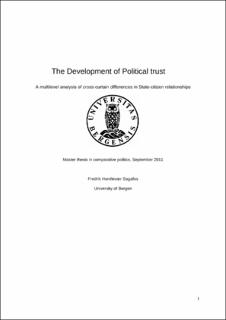The Development of Political trust: A multilevel analysis of cross-curtain differences in State-citizen relationships
Master thesis
Permanent lenke
https://hdl.handle.net/11250/3114396Utgivelsesdato
2011-09-20Metadata
Vis full innførselSamlinger
- Master theses [113]
Sammendrag
This analysis is based on a multidimensional view on political trust, aiming to explore whether there are significant differences in the causal effects of political trust between Western and Eastern Europe. Using the classic theoretical division between cultural and institutional theories, I hypothesize that the large differences in political development during the 19th century has resulted in different causal relationships across the old iron curtain. The thesis investigates effects on both institutional trust and support for democratic values. To explore these multiple dimensions of trust, I employ a multilevel statistical design. By using interaction effects, I investigate whether causal relationships differ in strength or direction dependent on which side of the old iron curtain you live. Is the east-west division still present and relevant?The most obvious pattern the analyses provide is that there indeed is a divide, and that many interactions prove significant. However, all effects are weaker in the Eastern European countries, in contrast to the hypothesized effects. Thus, it seems, the theories of political trust tested in a western industrialized context by theorists such as Kenneth Newton, Russell Dalton and Robert Putnam seem less applicable in a post-communist context. This thesis is thus a call for new, more refined theories that can explain the lack of political trust in Eastern Europe.
